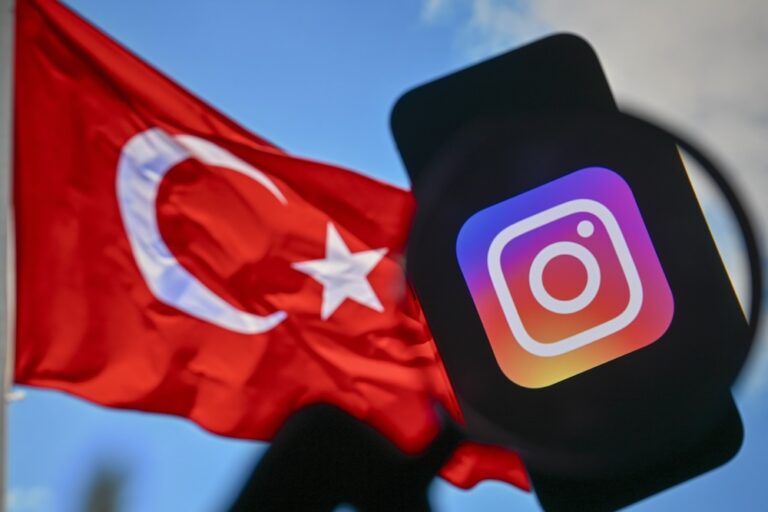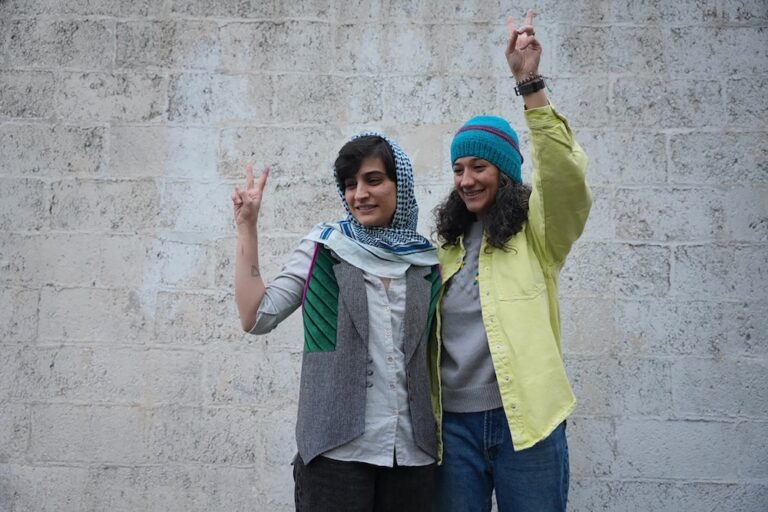(IPI/IFEX) – The nightmarish statistics speak volumes: seven journalists killed in Colombia, four in Mexico, three in Guatemala, two in Brazil, two in Peru, one in El Salvador, and one in Argentina (the gruesome discovery of Jose Luis Cabezas’ charred, handcuffed body in January brought back hideous memories of the darkest days of the Argentinian […]
(IPI/IFEX) – The nightmarish statistics speak volumes: seven journalists
killed in Colombia, four in Mexico, three in Guatemala, two in Brazil, two
in Peru, one in El Salvador, and one in Argentina (the gruesome discovery of
Jose Luis Cabezas’ charred, handcuffed body in January brought back hideous
memories of the darkest days of the Argentinian military dictatorship). Much
of Latin America has proved a perilous battleground in which to work as a
journalist during 1997.
And tragically, those grim figures do not even tell the full story. For in
many of the countries mentioned above, journalists were kidnapped,
physically assaulted or otherwise threatened by drug-traffickers or other
thugs or by forces close to the government, in an attempt to intimidate them
out of reporting on their activities. Even where the authorities are not
thought to have been directly involved, the perpetrators have rarely been
caught and the official investigations have often been disgracefully slow.
In one particularly appalling case in Mexico, four men forced a 30-year-old
crime reporter for Television Azteca, Rene Solorio, off the road on 13
September, dragged him out of his car at gunpoint, and, after nearly
suffocating him by putting a plastic bag over his head, they shouted: “We’re
going to kill you … It’s time to quit now.” They also told him that they
had already murdered his entire family. They tortured him all night by
putting a gun in his mouth or firing it near his head, finally releasing him
at dawn.
This edition of the annual World Press Freedom Review – the most
comprehensive survey of its kind anywhere – looks at the state of the media
in more than 150 countries around the globe, from the hard-line Stalinist
dictatorships (North Korea) to the liberal democracies (Sweden). The most
disappointing point to note about the Latin American nations cited above is
that they are all, in theory at least, pluralistic democracies with
constitutions and heads of state pledging support for press freedom. Some
hope! Increasingly, when the maxim is not “Kill the messenger,” it is “Blame
the messenger.”
Peru this year saw the worst violations of press freedom since President
Alberto Fujimori dissolved Congress and introduced temporary censorship in
his 1992 “self-coup.” Journalists were kidnapped, beaten, arrested and – in
the most prominent case, that of Baruch Ivcher, head of the private
television channel, Frecuencia Latina Canal 2 – stripped of his Peruvian
citizenship in a move blatantly designed to silence the station’s outspoken
investigations into government corrupt practices, especially the
intelligence services’ systematic phone-tapping of journalists, politicians
and businessmen.
Look at Africa, and in particular the horror that is Nigeria under the
current Abacha dictatorship. Ever since the press began suggesting in
September that the head of state might not be entirely healthy, his security
forces went into overdrive, pulling in editors and reporters for
interrogation, or worse, on a virtually daily basis. At least four
journalists remain behind bars, and countless others know that the same fate
awaits them if they overstep the lines laid down so crudely by the military
regime.
And Nigeria was by no means Africa’s only offender in 1997. Zambia continued
its downward slide into the dark ages, a trend exacerbated after the
attempted coup, when the Chiluba regime once again blamed the messenger by
sacking nearly a dozen editorial staff from state-run television. Both
Swaziland and Botswana have been planning to introduce media Bills which
would pose severe threats to journalists’ freedom to exercise their
profession. The Swazi Bill, if passed, would establish a media council with
powers to de-register journalists and fine or imprison them for up to seven
years. In Sierra Leone, virtually all independent journalists have been
forced into exile or hiding, in fear of their lives, after this year’s
military coup.
Even changing a country’s name and head of state at the same time – as in
the case this year of Zaire, where the ailing dictator, Mobutu Sese Seko,
having fled the brutal fighting, died in exile and the new regime renamed
the nation (so far unjustifiably) the Democratic Republic of Congo – is no
guarantee of a fresh injection of hope and democracy. The new authorities
have cracked down on journalists, both local and foreign, with virtually the
same relish as their predecessors.
The astonishing collapse of the economies in many parts of South East Asia
during the year prompted governments in the region, especially those where
the media have been relatively unfettered to exert increasing pressure on
journalistic dissent, and on those speaking to the press, in order to
silence coverage of the authorities’ inability to control the situation. In
Malaysia, the government issued a gagging order banning professors and
researchers from discussing the serious smog which has plagued parts of
South-East Asia this year. Asia, moreover, suffered its own tragic toll of
murders in 1997. Two journalists were killed in Indonesia, three in Pakistan
and, yet again, two in the Indian-administered region of Kashmir.
The three snippets of good news to emerge from China this year – the freeing
of the Hong Kong reporter, Xi Yang, from a Beijing jail in January, the
release of the leading Chinese dissident, Wei Jingsheng, on medical parole,
in November, and the fact that, so far, the Chinese authorities do not
appear to have interfered overtly to clamp down on freedom of expression in
Hong Kong, the British colony handed back to Chinese rule on 30 June – could
not disguise the bare fact: Beijing does not have the slightest
understanding, still less a liking, for press freedom or an atmosphere
permitting opposition viewpoints, and the death of the 92-year-old leader,
Deng Xiao Ping, in February has done nothing to change this stance. Those
who err are punished, and the authorities do not forget. The dissident poet
and freelance journalist, Liu Hongbin, now living abroad was expelled from
China in March after visiting his mother. He has been banned from ever
returning. In a harrowing incident which illustrated just how oppressive the
Beijing regime is, a leading journalist , Wei Guoqiang, Washington bureau
chief of the official Chinese news agency, Xinhua, killed himself after
being called back to China, apparently as he was planning to defect.
Central and Eastern European and the former Soviet republics continue to
feel their way, some decidedly more tentatively, if not downright
unwillingly than others, towards a stage where governments can appreciate
the essential value of a free press in a democracy. But for some, the step
seems simply too large to make. In Slovakia, Vladimir Meciar managed both to
get cross with journalists for claiming that they were not free – and then
doing his best to show that they were right (culminating in his decision, in
early December, to stop the regular weekly press conferences).
In Russia itself seven journalists or media executives were murdered in
1997, and the peace accord in the troubled region of Chechnya was rocked to
its foundations by a series of kidnappings of reporters. In Belarus, a
prominent Russian TV correspondent, Pavel Sharamet, was brazenly arrested
for his “biased reporting,” stripped of his accreditation and put on trial
for “spying in the pay of a foreign power.” Local journalists were
frequently beaten up. The courageous newspaper, “Svaboda”, was ordered to be
closed down in November. A frighteningly harsh new press law is being
debated allowing the State Committee, directly controlled by Belarus’
authoritarian President Alexander Lukashenko, to ignore all court decisions,
suspend publications and impose heavy libel penalties on newspapers. (A
government spokesman, Ivan Sokolovsky, director of the state-run National
Press Centre, even told an IPI meeting in Vienna: “When Belarus became
independent, we had no experience, and we perhaps introduced press freedom
too quickly This brought the country to the brink of cataclysm.” Chilling
words, indeed.)
In some other former Soviet republics, such as Azerbaijan and Uzbekistan,
the head of state is increasingly behaving towards the media with all the
cold, iron-fistedness of an old-style Communist leader, which of course is
precisely what he is. Kyrgyzstan became the first former Soviet republic to
jail a journalist for libel.
The guns are silent in the Balkans but the struggle for press freedom is
far from over. In Serbia and Croatia, independent journalists have to fight
for every breath of fresh air, and the number of free media outlets is
steadily diminishing as Presidents Milosevic and Tudjman, respectively, seek
to ensure that their voice is the one heard by the people. In Bosnia,
President Alija Izetbegovic lashed out at three magazines in November,
calling them “traitors financed by foreign sources.”
Although the 1995 Dayton peace accord identified free and open media as a
precondition for the construction of a peaceful democratic society,
international observers say that the Bosnian media have not been reformed
and that they still report largely on the basis of separate Moslem, Serb and
Croat viewpoints.
The death of Britain’s Diana, Princess of Wales in a car crash in Paris on
the night of 31 August sparked a wave of soul-searching among tabloid
journalists worldwide, when it emerged that her car had been chased into the
tunnel by paparazzi photographers. Although the news that the driver had
been drinking heavily before the crash confused the issue, governments
worldwide quickly made calls – predictably, the most vociferously from the
authoritarian Chinese or Vietnamese variety, but also leaders of more
traditionally liberal like New Zealand – for the press to put its house in
order (with the implied threat that, if the media could not do this
themselves, the authorities would do it for them with new privacy laws.)
Legislation remains one of the keys to continuing repression of the media in
both dictatorships and democracies, whether it be harsh libel and secrecy
laws (which have led to some terming the press in Britain as only
half-free), licensing laws (ensuring that governments can choose friends as
journalists) or a bewildering array of archaic and arcane pieces of
legislation which give the authorities a last-resort pretext to muzzle
critics, when all else fails. Even when governments make a gesture, like
Turkey’s decision, following the visit of a high-level press delegation,
including the IPI, to bring in a new amnesty law under which several
editors were released from jail this year, the result was largely cosmetic:
the amnesty applied only to editors. Some 70 journalists remain behind bars
in Turkey, for simply expressing their point of view.
And then there is the reverse method, namely, preventing other, genuinely
needed legislation being passed, or deliberately slowing the process down to
a crawl. All governments used to controlling television or national news
agencies have been guilty, at one stage or another, of fighting off the
inevitable relinquishing of the reins over an invaluable propaganda tool.
Some of the emerging democracies in Central and Eastern Europe and Africa
still need to learn that they cannot call themselves democrats while
clinging on to media monopolies.


